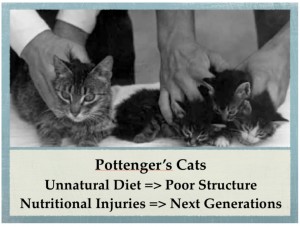Dr. Pottenger’s Cats, Epigenetics, and Optimal Health
*Thanks for reading! This is a special blog post of an essay that was part of the current Nutrition Therapy Practitioner training I am undergoing. I will be posting all my essays as time allows. This particular essay was on the 1930’s study of Dr. Pottenger and his study on the diets of cats. Enjoy!
Epigenetics: the idea that environmental factors such as nutrition, lifestyle behaviors, and stress can turn on or turn off genes. Certain genes switched on or switched off can determine the potential of diseases and chronic issues, and even moreso that of the genes of future offspring. And there are several studies, including the one described here led by Dr. Francis Pottenger which highlight just how important it is to create optimal health through our environment not only for ourselves, but for the outcome of our children and our even our children’s children.
Dr. Pottenger was a physician who during the 1930s and 40s conducted a study on cats who were either fed a raw diet consisting of raw meats and raw milk, or a diet consisting of some heat-processed foods such as pasteurized milk and even sweetened condensed milk. The results were remarkable, in that, Dr. Pottenger saw a vast improvement in the health of not only the first generation of raw meat, raw milk fed cats, but more importantly in the second and third generations (the offspring) as well. However, the cats fed a diet which had undergone any amount of heat-treated processing, showed issues such as respiratory, agility, and even reproduction issues to the point that they were unable to reproduce beyond the third generation.
How does this equate to us as humans and epigenetics?
Perhaps while it may be far-fetched to compare the diet of cats to the diet of humans, it’s easy to correlate that a diet consisting mainly of unprocessed foods provides a vast array of nutrients for growth and development. It’s also easy to correlate that a diet consisting mainly of processed, heat-treated foods would be void of nutrition, and would also set the stage for lowered immune function, poor growth, and damaged cell turnover.
So, how does that fast-food burger you eat today determine the outcome of your grandchildren in years to come? If I use my own family history as an example: My mother didn’t need glasses and had exceptional eye-sight, however, she succumbed to the 70s and 80s craze of low fat, processed diet-food mentality. Could that have been why I was born with near-sightedness? And if we trace it back further, my own grandmother had no issues of anxiety or depression yet relied frequently on processed potato chips and Coca-cola as a daily snack. Could that be the determining factor behind why my mother, and 3 other of her siblings developed high levels of anxiety, and obsessive compulsive issues? While there is no way of determining that these were the definite causes, we can clearly look to statistics to see that as the use of processed heat-treated foods has risen in consumption, the prevalence of chronic diseases and auto-immune illnesses has risen as well, as stated in the article: https://multiplesclerosisnewstoday.com/2016/01/08/rise-ms-autoimmune-disease-linked-processed-foods/
Thanks to Dr. Pottenger, we can clearly see the importance and long-term benefits of eating foods that are as unprocessed as possible. And even moreso than that, one can start to ponder the following: The notion that cats obviously would do well to eat their so called “native foods” (raw meat, raw milk) that they would traditionally hunt for and have access to in the wild as carnivores, likewise can be compared to how we as humans would also flourish on our native foods. All humans are omnivores, but it’s wise to ponder how someone of Northern European decent would not thrive as well on tropical foods, as they would foods that were naturally found in Northern Europe such as oats, berries, and seasonal vegetables grown in Northern European climates. Similarly, those of tropical decent may not experience as much nourishment from grains and other foods not traditionally found in tropical settings. All of these factors play a large role in our epigenetics, and we would do well to mimic as much of an optimal, native diet, consisting of local, fresh, seasonal, unprocessed foods as possible, if not for ourselves, for future generations.




Leave a Reply
Want to join the discussion?Feel free to contribute!